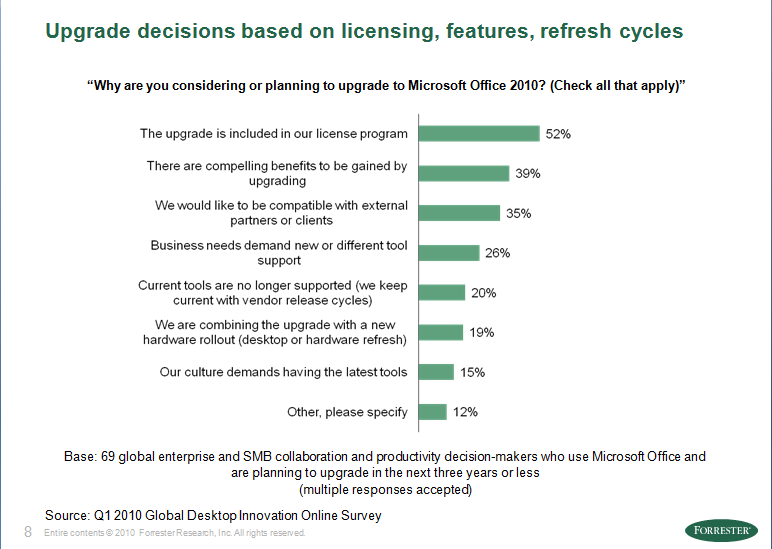Forrester: Google still a distant Office competitor

For all the noise about -- and from -- Google giving Microsoft a run for its money in the office/productivity market, the reality is rather different, according to Forrester Research.
New Forrester data, released on May 11, claims that 81% of the enterprises it surveyed are running Office 2007 and 78% supporting SharePoint, compared to only 4% using Google Apps. Forrester also says that one third of survey respondents are already planning an upgrade to Office 2010 within the next 12 months. (Forrester's sample is 115 North American and European enterprise and SMB decision makers, the researchers said.)
Forrester analysts found that those it surveyed are thinking about moving to SharePoint 2010 before they move to Office 2010. They also found in cases where enterprises had "Office alternatives" installed or being installed, that these alternatives were more complements to Microsoft Office than replacements for it. Sometimes these alternatives are aimed at specific workforce segments within a larger organization, Forrester said. From Forrester's conclusions:
"The alternatives to Microsoft Office today do not meet the needs of the enterprises Forrester surveyed. Common end user barriers to adoption of alternatives include lack of required functionality, third-party integration requirements, user acceptance, lack of seamless interoperability with Office, and legacy content support needs. These gaps will be bridged in the coming years as Google, OpenOffice.org, and others mature."
Why are businesses anxious to move to Office 2010? Here is a chart from Forrester that outlines the reasons (with survey takers allowed to vote for as many options as applied):
(Click on the chart to enlarge it.)
The top three reasons for upgrading to 2010, according to Forrester:
- The upgrade is included in our license program (52 percent)
- There are compelling benefits to be gained by upgrading (39 percent)
- We would like to be compatible with external partners or clients (35 percent)
What about the reasons for not upgrading? More Forrester survey data:
(Click on the chart to enlarge.)
The top three reasons for not moving to Office 2010:
- We recently upgraded or are still in the process of moving to Office 2007 (54 percent)
- We don't see a compelling business reason to upgrade (37 percent)
- We are moving to an Office alternative (7 percent)
Google has been on a road show for the past week-plus, meeting with many of us in the Microsoft blogging/press corps to push its message that Google Docs/Google Apps has been making a serious dent in Microsoft's Office/SharePoint sweet spot. I think competition is a good thing -- for customers (in terms of giving them more pricing leverage) and for partners (giving them price leverage and more variety in their portfolios). But I still haven't seen many large businesses moving to Google. (In fact, Google execs admit ithe company only has a "few dozen really large enterprises," and keep touting Genentech as the poster child.)
Google execs note that it's interesting to see Microsoft "acknowledging" Google with moves such as the introduction of Office Docs.com (the Office Web Apps-Facebook integration project from Microsoft's FUSE Labs). I agree with Google: There is no way that Microsoft didn't think "Google Docs" when naming and positioning Office Docs.com. However, I also find it telling that Google is pushing a "we're not an Office alternative; we're a collaboration-tool complement" messaging right before the Office 2010 launch.
Who's more afraid of whom here? And who should be most afraid?
